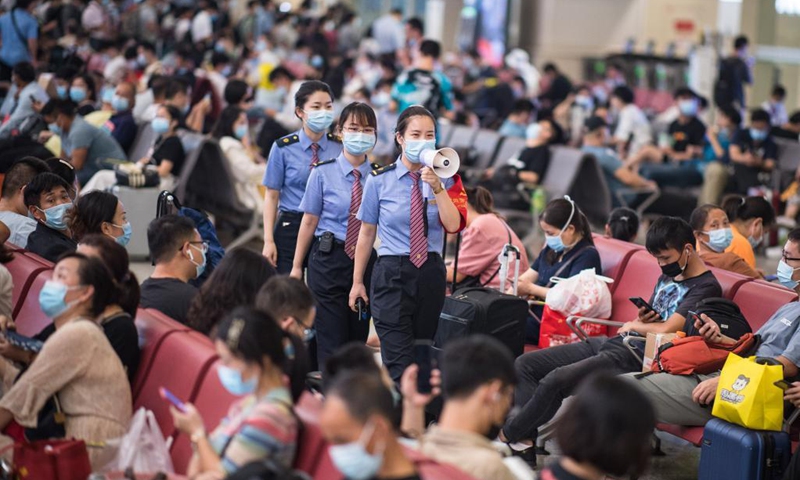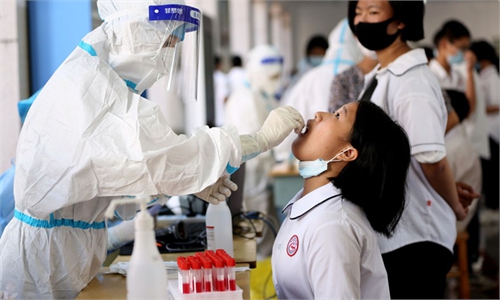China's 'zero tolerance' COVID-19 policy to safeguard the country to withstand epidemic flare-ups amid holidays

Staff members of Hankou Railway Station remind passengers to follow epidemic prevention rules in Wuhan, Central China's Hubei Province, on Sunday, the first day of the three-day Mid-Autumn Festival holidays. Photo: Xinhua
Public health observers are confident that China's "zero tolerance" COVID-19 policy will safeguard the country to withstand epidemic flare-ups, although the outbreak in East China's Fujian Province is still intense and Northeast China's Heilongjiang Province reported three fresh cases on Tuesday during the national holidays to mark the Mid-Autumn Festival.
Experts said fighting the COVID-19 epidemic will be a long-term task for China, given the severe epidemic situation in the rest of the world, but the public should not overreact. The country has demonstrated its strong capability to overcome epidemic flare-ups and now is devoting efforts to further improve and optimize its "zero tolerance" COVID-19 policy by requiring epidemic regions to act faster and more precisely, and to seek a balance between epidemic prevention and economic development.
Shortly after Harbin, capital of Heilongjiang Province reported three positive COVID-19 cases on Tuesday, the city's anti-epidemic group announced measures to cut off any potential virus spread. The National Health Commission dispatched a working group to Harbin to guide the city's response efforts.
Harbin authorities have urged residents to not leave the city unless very necessary, closed public venues, suspended large-scale activities and rolled out nucleic acid testing. The source of infection for these three cases is so far unknown.
As provincial authorities in Fujian have implemented strict anti-epidemic measures to cut off virus transmission routes, including carrying out at least four rounds of nucleic acid tests in some cities, tracked, tested and quarantined more than 194,000 people across the province that had links with COVID-19 infections, and imposed restrictions on cross-region travel, the Fujian outbreak that registered more than 400 confirmed infections has not spilled over to other provinces and cities.
Chinese Vice Premier Sun Chunlan, who was in Fujian Province for an on-spot inspection and guidance, called for local authorities to be "faster, stricter and quicker" in epidemic control. Though Fujian achieved phasal achievements, uncertainties still exist, Sun said.
The Global Times found that under China's strict and precise epidemic prevention and control policy, Chinese people have spent a normal, stable and peaceful Mid-Autumn Festival and the country witnesses a booming cross-regional tourism market.
This Mid-Autumn Festival holidays recovered to 87.2 percent of the pre-epidemic level of trips made in 2019, registering over 88.15 million trips, data from the Ministry of Culture and Tourism said on Tuesday.
Data provided to the Global Times by Chinese tourism website Lvmama.com on Tuesday shows the Fujian epidemic did not halt tourism and travel. The cities of Zhuhai, Shanghai, Wuxi, Suzhou and Beijing were among the top city destinations, and South China's Guangzhou Province was also an extremely popular destination.
Wang Guangfa, a respiratory expert at Peking University First Hospital, told the Global Times on Tuesday that cases in Harbin and the clusters in Fujian may dampen public expectations for the approaching National Day holidays, but the public should not panic as the government has learned how to protect the country from falling victim to the epidemic.
Due to local governments' vast experience in daily epidemic control and the good performance of Fujian government in handling the emerging epidemic, no other positive COVID-19 cases connected to the Fujian outbreak were reported in other provinces and regions since Fujian's first case on September 10, Wang said.
"We have seen a booming tourism market in most of China during the Mid-Autumn Festival and scenic spots in some cities are even crowded. Fewer cities advocate travel restrictions as local governments are better at striking a balance between epidemic prevention and normal society development," Wang said.
The Wuhan-based virologist Yang Zhanqiu reassured the public by encouraging them not to cancel travel plans for the National Day holidays to low-risk areas while following personal protective measures.
Yang said Fujian's outbreak is already under control and will ease in the next few days as all close contacts have been quarantined. As for the COVID-19 infection in Harbin, Yang said it is only sporadic and local authorities reacted fast enough to prevent transmission.
As long as the epidemic overseas continues, China will always have sporadic cases but China is not that fragile. Now the country has successfully gone through the Mid-Autumn Festival holidays, the National Day holidays will not be a problem, Yang believes.
At a seminar held on Friday and Saturday in Shanghai, the joint prevention and control mechanism of the State Council called for local governments across China to learn from Shanghai in epidemic prevention so as to further improve the country's precise anti-epidemic policy.
Wang interpreted the seminar as a part of China's efforts to optimize China's "zero tolerance" COVID-19 policy. It requires local governments to respond faster and more precisely when an outbreak erupts and learn from Shanghai that epidemic prevent and control efforts should not force an entire city to come to a standstill. A balance between controlling the epidemic and continuing a normal economy and production must be sought.



